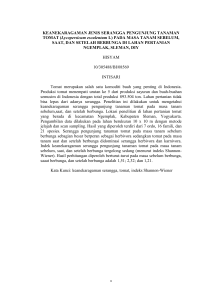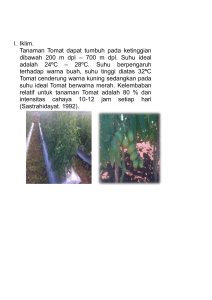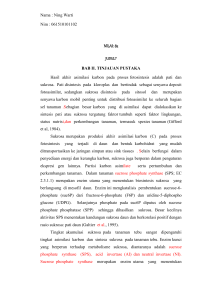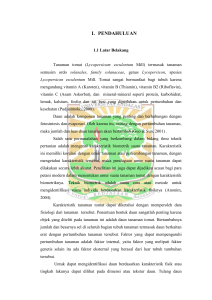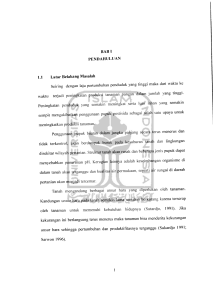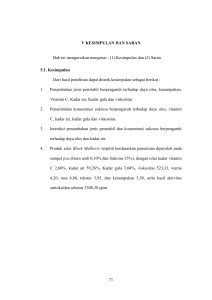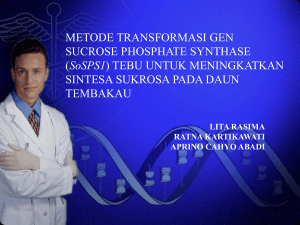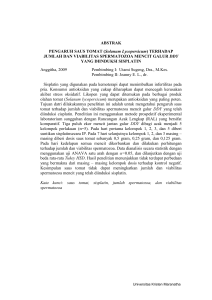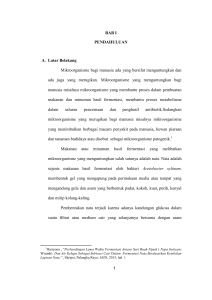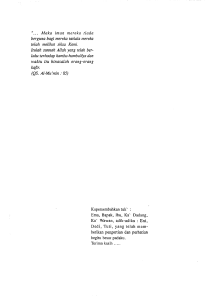Regenerasi Beberapa Varietas dan Overekspresi Gen
advertisement
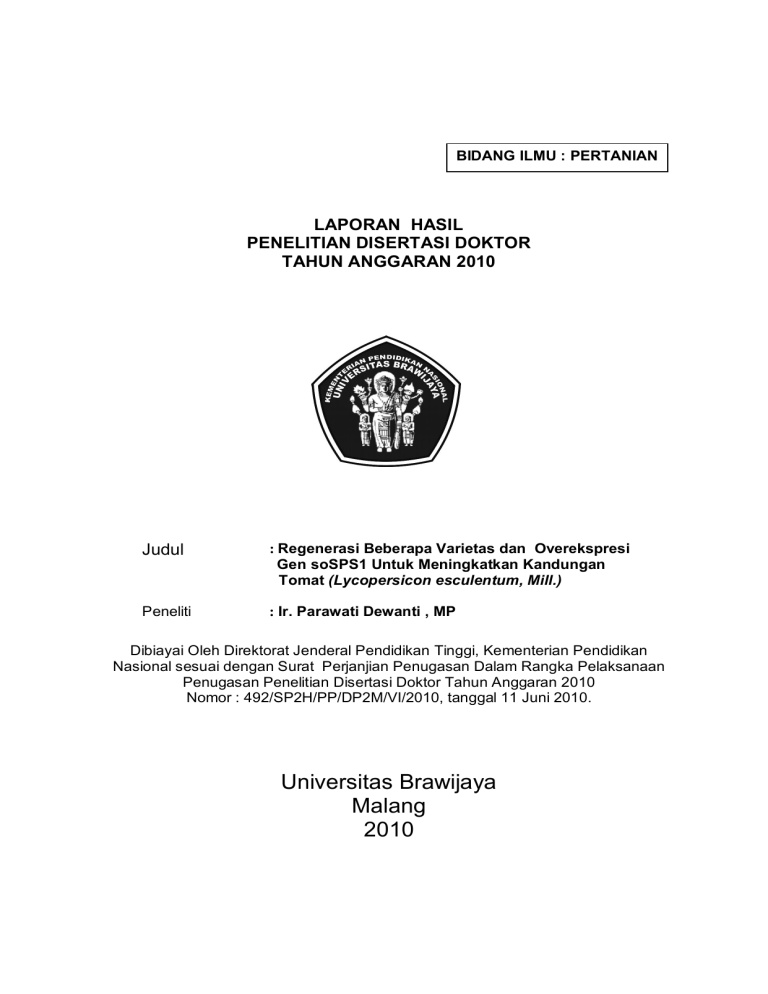
BIDANG ILMU : PERTANIAN LAPORAN HASIL PENELITIAN DISERTASI DOKTOR TAHUN ANGGARAN 2010 Judul Peneliti : Regenerasi Beberapa Varietas dan Overekspresi Gen soSPS1 Untuk Meningkatkan Kandungan Tomat (Lycopersicon esculentum, Mill.) :::: Ir. Parawati Dewanti , MP Dibiayai Oleh Direktorat Jenderal Pendidikan Tinggi, Kementerian Pendidikan Nasional sesuai dengan Surat Perjanjian Penugasan Dalam Rangka Pelaksanaan Penugasan Penelitian Disertasi Doktor Tahun Anggaran 2010 Nomor : 492/SP2H/PP/DP2M/VI/2010, tanggal 11 Juni 2010. Universitas Brawijaya Malang 2010 Ringkasan Tomat (Lycopersicon esculentum Mill.) merupakan komoditas sayuran buah yang berperan penting dalam perekonomian di Indonesia. Tanaman ini merupakan tanaman dikotil yang termasuk dalam famili Solanaceae. Dalam proses fotosintesis tanaman tomat akan menghasilkan sukrosa dan pati. Fungsi sukrosa pada tanaman yang sedang mengalami pertumbuhan adalah sebagai sumber energi dan sumber kerangka karbon dalam metabolisme. Upaya untuk meningkatkan produksi sukrosa pada tanaman tomat dapat dilakukan melalui metode transformasi genetik. Transformasi gen sudah pernah dilakukan pada beberapa tanaman dikotil seperti tomat, tembakau dan lainnya. Banyak macam gen yang dapat ditransformasi ke tanaman, antara lain gen yang mengkode untuk protein SPS. Sukrosa Phophat Synthase (SPS) merupakan enzim yang menentukan kandungan sukrosa dan merupakan enzim kunci dalam asimilasi karbon pada tanaman. Kloning gen SPS (Sucrose Phophat Synthase) dari tebu yang dinamakan dengan SoSPS1 sudah berhasil dilakukan di Laboratorium Biologi Molekul Universitas Jember. Tujuan dari penelitian ini adalah untuk mengetahui peningkatan kandungan sukrosa pada buah tomat akibat over-ekspresi gen SPS. Hasil penelitian diharapkan dapat diperoleh tanaman tomat Produk Rekayasa Genetik (PRG) dengan kadar sukrosa meningkat dibandingkan tanaman kontrol. Hasil penelitian menunjukkan bahwa : (1) Varietas Zamrud, kombinasi zat pengatur tumbuh IAA : BAP (0,2 ppm : 2 ppm) dan eksplan kotiledon mempunyai kemampuan regenerasi lebih tinggi dibandingkan perlakuan yang lain ; (2) Infeksi pada eksplan kotiledon dan tunas menghasilkan tanaman putatif transforman sebesar 9% dan 4% dan telah diperoleh tanaman tomat putatif transforman sebanyak 8 klon ; (3) Hasil overekspresi SoSPS1 menghasilkan aktivitas enzim SPS meningkat 15%, kandungan sukrosa daun 2,16 kali dan kandungan sukrosa buah meningkat 1,99 kali. Kata Kunci : Tomat (Lycopersicum esculentum Mill.), Sukrosa, Overekspresi, Gen SoSPS1 SUMMARY Tomato (Lycopersicon esculentum Mill.) is a fruit vegetables play an important role in the economy in Indonesia. This plant is a dicotyledonous plant belonging to the Solanaceae family. In the process of photosynthesis of tomato plants will produce sucrose and starch. The function of sucrose in plants is emerging as an energy source and source of carbon skeleton in metabolism. Efforts to increase the production of sucrose in the tomato plant can be done through genetic transformation methods. Gene transformation has been done on some dicotyledonous plants such as tomatoes, tobacco and others. Many kinds of genes that can be transformed into plants, such as genes coding for proteins SPS (Phophat Sucrose Synthase). Phophat Sucrose Synthase (SPS) is an enzyme that determines the content of sucrose and is a key enzyme in carbon assimilation in plants. Gene cloning SPS (Sucrose Synthase Phophat) from sugar cane called with SoSPS1 already successfully done at the Laboratory of Molecular Biology, University of Jember. The purpose of this study was to determine the increase of sucrose content in tomatoes due to over-expression of SPS genes. This results can be obtained from tomato transgenic plants with sucrose content increased compared with control plants. The results showed that: (1) Zamrud variety, a combination of growth regulators IAA: BAP (0.2 ppm: 2 ppm) and cotyledon explant regeneration ability is higher than the other treatments, (2) Infection of the explant cotyledons and shoots produce putative transformed plants by 9% and 4%, and have obtained putative transformants of tomato plants by 8 clones, (3) The overexpression SoSPS1 produce SPS enzyme activity increased by 15%, the leaf sucrose content increased 2.16 times and the fruit sucrose content increased by 1.99 times . Keywords: Tomato (Lycopersicum esculentum Mill.), Sucrose, overexpression, gene SoSPS1 DAFTAR PUSTAKA Afroz, A., Z. Chaudhry, R. Khan, H. Rashid AND S. A. Khan. 2009. Effect of GA3 on regeneration response of three tomato cultivars (Lycopersicon esculentum). Pak. J. Bot., 41(1): 143-151. Ahsan N., S.H. Lee., D.G. Lee., M. Anisuzzaman (2007). The effect of wounding type, preculture, infection method and cocultivation temperature on the Agrobacterium mediated gene transfer in tomatoes. Annals of Applied Biology 151 : 363-372 Balitsa.2009. Varietas Unggul Harapan Tomat Hibrida dari Balitsa. http://hortikultura.litbang.deptan.go.id. Chaudhry, Z., A. Afroz AND H. Rashid. 2007. Effect of variety and plant growth regulatoers on callus proliferation and regeneration response of three tomato cultivars (Lycopersicon esculentum). Pak. J. Bot., 39(3): 857-869. Cortina C. & F. A. Culi´añez-Maci`.2004. Tomato transformation and transgenic plant production. Plant Cell, Tissue and Organ Culture 76: 269–275 Ellul P, Garcia-Sogo B, Pineda B, Rios G, Roig LA & Moreno V. 2003. The ploidy level of transgenic plants in Agrobacteriu-mmediated transformation of tomato cotyledons (Lycopersicon esculentum L. Mill.) is genotype and procedure dependent. Theor. Appl. Gen. 106 (2): 231–238 Farid Uddin, M.D., SH MD Asraful Islam, N. Sultana and M.H. Kabir Shiragi. 2004. Effect of variety and plant growth regulators in MS medium on callus Proliferation from Virus infected Tomato plant. Asian network for scientific information Biotechnology. 3(2): 181-186. Gubis. J., Z. Lajchova, J. Farago, and Z. Jurekova. 2004. Effect of growth regulators on shoot induction and plant regeneration in tomato (Lycopersicon esculentum Mill.) Gubis, J., Z. Lajchova, L. Klcova and Z. Jurecova. 2005. Influence of growth regulators on plant regeneration in tomato. Hort. Sci. 3 : 118 – 122 Hackel A., N. Schauer, F. Carrari, A. R. Fernie, B. Grimm and C. Kuhn. 2006. Sucrose transporter LeSUT1 and LeSUT2 inhibition affects tomato fruit development in different ways. Plant Journal. 45 :180–192 Miswar, B. Sugiharto, T. Handoyo, Dan S. A. Made, 2007. Peranan Sucrose Phosphate Synthase (SPS) dan Acid Invertase (AI) Internoda Tebu (Saccharum officinarum L.) dalam Akumulasi Sukrosa. Agritrop, 26 (4) : 187 .193 Miswar. 2007. Peningkatan biosintesis sukrosa tanaman tebu (Saccharum officinarum L.) melalui over ekspresi gen sucrose phosphate synthase (SPS). Disertasi UGM.Yogya. Plevnes, D.R., Danuta K., Marta G., Katarzyna K., and Jadwiga K. 2006. The Effect of Growth Regulators and Culture Conditions on The Callus Induction in Tomato (Lycopersicon Sp.). Acta Sci.Pol., Hortorum Cultus 5(2) : 23-34 Qiu D., G. Diretto, R. Tavarza, G. Giuliano. 2007. Improved protocol for Agrobacterium mediated transformation of tomato and production of transgenic plants containing carotenoid biosynthetic gene CsZCD. Scientia Horticulturae 112 : 172–175 Santoso T.J., A. Sisharmini dan M. Herman.2009. Respon Regenerasi Beberapa Genotipe Dan Studi Transformasi Genetik Tomat (Lycopersicon esculentum Mill.) Melalui Vektor Agrobacterium tumefaciens. Balai Besar Penelitian dan Pengembangan Bioteknologi dan Sumberdaya Genetik Pertanian. Sheeja T. E., A.B. Mondal and R.K. S. Rathore. 2004. Efficient Plantlet Regeneration in Tomato (Lycopersicon esculentum Mill.). Plant Tissue Cult. 14(1) : 45-53 Wijayani, A. dan W. Widodo. 2005. Usaha meningkatkan kualitas beberapa varietas tomat dengan sistem budidaya hidroponik. Ilmu Pertanian. 12 (1) : 77 – 83
